Understanding what started world war II is not easy. World war I was caused by the assassination of the Archduke of Austria-Hungary. However, world war II was not caused by a single country or a single event.
Recommended reading:
To really understand what started World War II, we should take a look at the events that unfolded during the interwar period.
What started World War II?
Interwar period
The interwar period is the name given to the period between the first and the second world wars. The first world war took a huge toll on humanity. So, once the war ended, the world tried to take all the precautionary measures to avoid another such war.
The world truly believed another world war wouldn’t break out. Yet, contrary to everyone’s beliefs, the events that unfolded during the interwar period led directly to the second world war.
This blog post aims to take a look at these events, which happened in different nations simultaneously.
Germany
To understand what started world war II, we have to look at the events that happened in Germany.
After the first world war ended, the leaders of several nations met in Paris to discuss the peace terms. It came to be known as the Paris peace conference of 1919.
In this conference, the victorious countries blamed Germany for starting the war. They decided to punish Germany harshly for their losses. These punishments, including massive reparation costs, demilitarization, and loss of territory, were formulated in the form of a treaty. This treaty came to be known as the Treaty of Versailles.
The Weimar Republic
During the first world war, German emperor Wilhelm II was ruling Germany. However, at the end of the war, he fled to the Netherlands. The government that came to power after that was called the Weimar Republic. To bring an end to the war, the Weimar Republic signed the armistice and the Treaty of Versailles.
Uncontrollable inflation
However, the Treaty of Versailles was too harsh on Germans. Indeed, it was so harsh that it took 92 years (2010) for Germany to finish paying its reparation costs.
The reparation payments destroyed the German economy. As Germany did not have enough money for the reparation payments, it had to print extra money. Since there was more money now, but the same amount of products, prices of products skyrocketed. As a result, Germany suffered from devastating hyperinflation. By September 1923, four billion German marks had the value equal to one US Dollar.
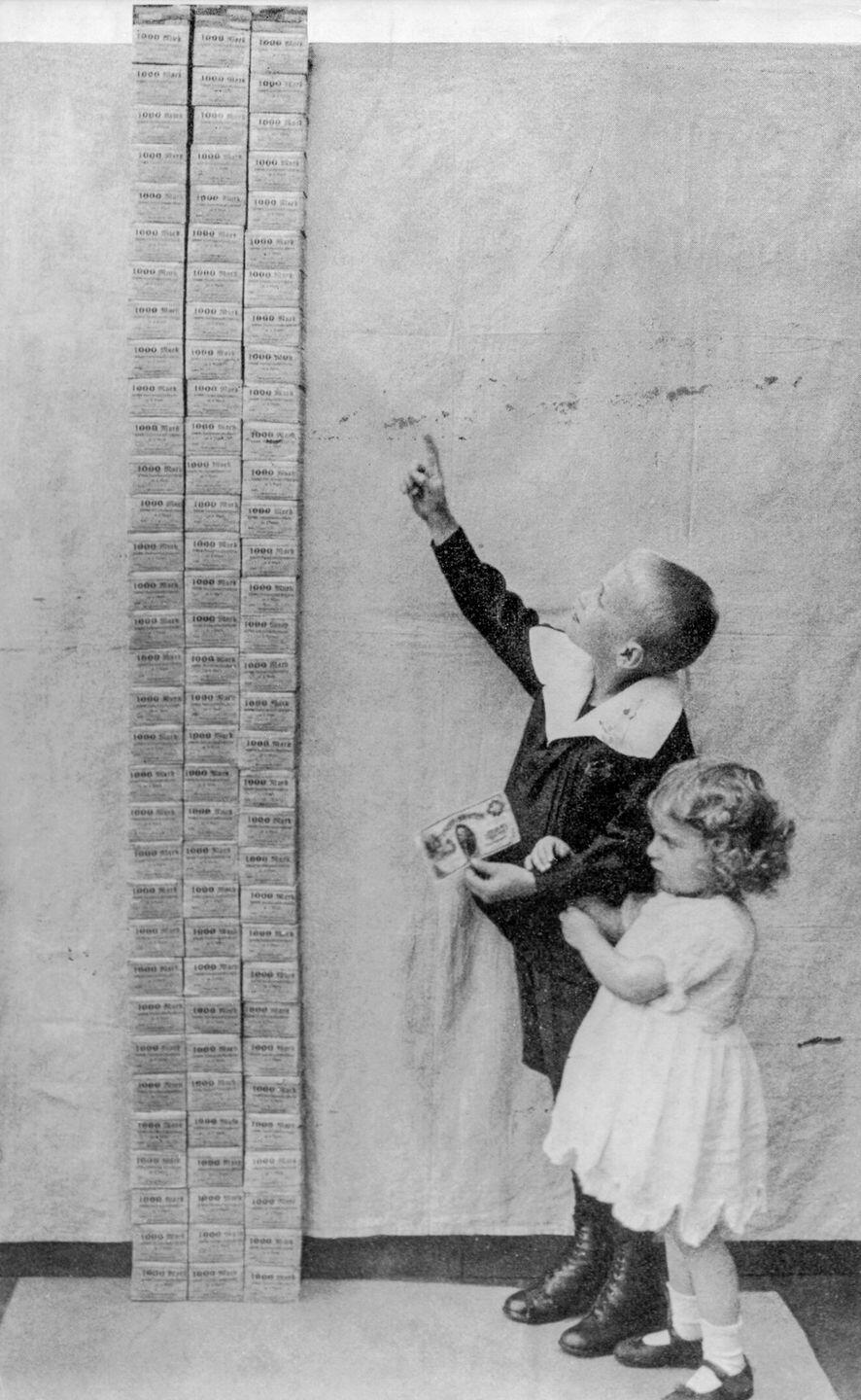
Germany, 1923 – Children stand next to a tower of 100,000 marks, equal in value to one US dollar.
French soldiers occupy Germany
Besides money, Germany was also forced to pay coal supplies to France because France lost its coal mines in the war. However, the amount of coal France demanded was technically impossible for Germany to produce.
Naturally, Germany failed to meet the demands of coal payments. Annoyed, the French soldiers occupied the Coal-mining region of Germany.
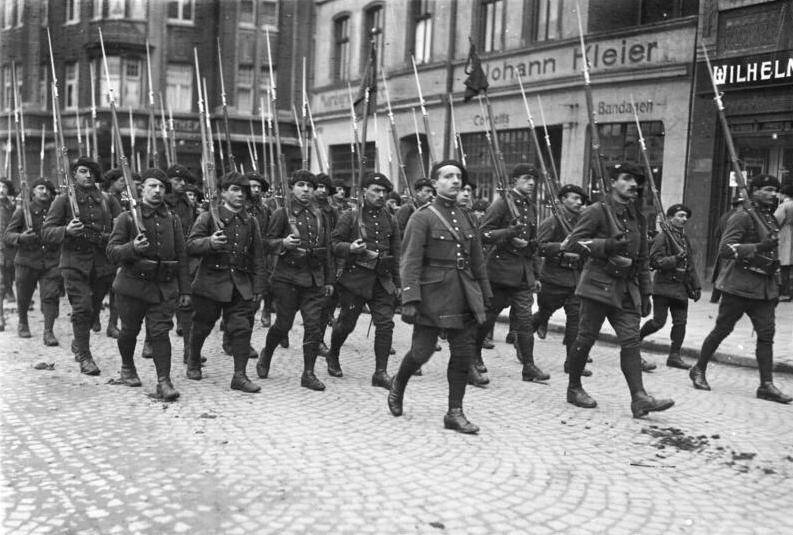
French soldiers occupy a German townBy Bundesarchiv, Bild 102-09896 / CC-BY-SA 3.0, CC BY-SA 3.0 de, Link
The Treaty of Versailles had stripped Germany of its military. So, even though the French soldiers occupied Germany, Germany couldn’t do anything against it. The Germans felt humiliated by this.
They blamed the Weimar Republic’s inability for signing the armistice and the Treaty of Versailles. They were also furious at the Weimar Republic for surrendering, particularly because many families had lost their men in the war, hoping for a victory.
The uncontrollable hyperinflation and Germany’s humiliation in the hands of France made the German public turn to other far-left (Communism) and far-right (Nazism) parties.
Around the same time, Nazism was slowly taking shape.
The Rise of Hitler
To understand what started world war II, we have to look at how a person like Hitler could attain the most powerful position in a country.
Adolf Hitler was a first world war veteran. Twice he was poorly wounded during the war, and twice he won a medal (Iron cross) for his bravery.
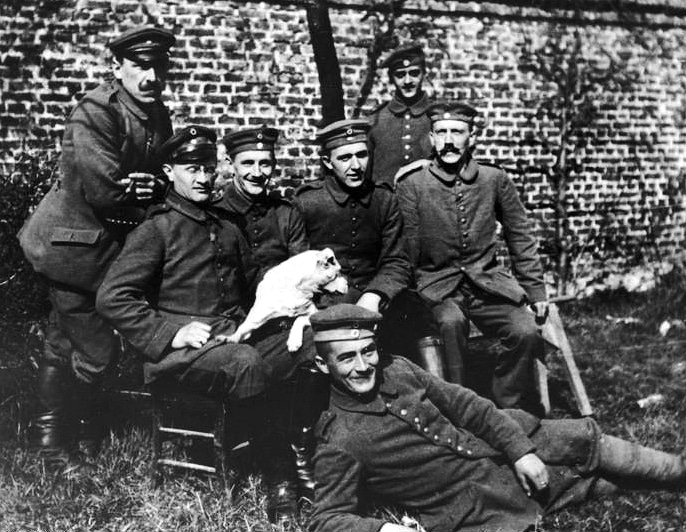
Hitler (far right, seated) with his army comrades(c. 1914–18)By Bundesarchiv, Bild 146-1974-082-44 / CC-BY-SA 3.0, CC BY-SA 3.0 de, Link
Like most Germans at that time, he believed that Germany could have won World War 1. Like most Germans, he hated the Weimar Republic for surrendering and agreeing to the harsh terms of the Treaty of Versailles. He believed that Jews were behind all this.
Hitler joins a party
Hitler had no career prospects since he lacked formal education. So, even after the war was over, Hitler tried to remain in the army. He was given a job as an intelligence officer in July 1919. Once, he was sent to investigate a small party called the German Workers’ Party (DAP), whose members were German nationalists who hated Jews.
While investigating the party, their views attracted Hitler. So (and also due to his superiors’ orders), in 1919, he joined the party as its 55th member.
Hitler becomes the leader of the party
Hitler was an amazing speaker who could mesmerize his audience and win them over. The party’s leadership soon recognized his exceptional oratory skills.
So, the party sent him to speak in meetings where people would flock to listen to him. Hitler soon moved up in the ranks from an ordinary member to the chief of propaganda of the party.
By the end of July 1921, Hitler had become the leader of the party and had renamed it as the Nationalist Socialist German Workers’ Party or the Nazi party in short.
What is Nazism?
Nazism (Nationalsozialismus – National socialism in German) did not believe in democracy and the parliamentary system. It did not believe in communism either. Instead, it believed in uniting all Germans under one country – the German greater Reich. Nazism also believed in improving the genetic quality of human beings. To this end, Hitler sought the elimination of certain races of people (Jews, Soviets, etc.), whom he considered genetically inferior to the Aryans (Nordic master race).
During the early years of the DAP (1920), the party released a 25-point program which outlined the party’s primary beliefs and policies. This program contained different sections that appealed to different classes of people. This gave Hitler a solid concept to campaign to the public.
Moreover, the economy was unstable, and many people hated the Weimar Republic. So, it was easy for Hitler to play on people’s fears and gain more party members.
As a result, the size of the nazi party grew from 2000 members to 20,000 members during the hyperinflation period.
Hitler creates his army
In 1921, Hitler also created the SA (Stürmabteilung – Storm Troopers in English). It consisted of former soldiers and unemployed men.
Their job was to serve as the party’s private army and protect the Nazi party during Nazi meetings and break up the meetings of their opponents.
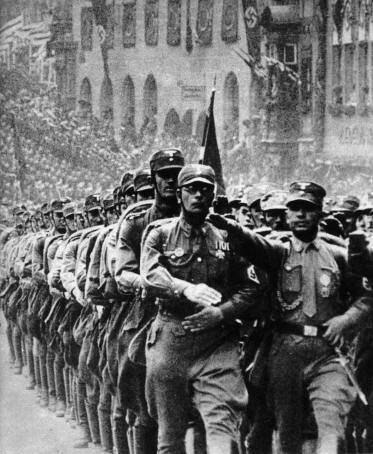
“Nazi Germany – Stormtroopers Sturm Abteilung SA” – History on the Net © 2000-2020, Salem Media. May 18, 2020
Hitler gains national popularity
In 1923, annoyed by the Weimar Republic’s incompetence and inspired by Mussolini’s ‘March on Rome,’ Adolf Hitler attempted to overthrow it using the SA. But he failed.
He was arrested, tried in a court, found guilty of treason, and sent to prison for five years. He was banned from speaking in public for the same amount of time. His party was banned too.
However, in those days, Germans hated the Weimar Republic so much that they lauded anyone who stood against it.
So, even though he failed, Adolf Hitler quickly became a national hero.
Hilter restructures his party
The prison sentence wasn’t too harsh on Hitler. Indeed, due to his good behavior, Hitler was released in just nine months.
During his time in prison, Hitler wrote his autobiography (Mein Kampf – My struggle in English). The book also explained his political views and his future plans for Germany. Millions of Germans who read it got an idea of who Hitler was and what his views were. So, even though Hitler was in prison, he and his ideas became well-known throughout Germany.
While in prison, he understood that revolutionary methods could not help him to gain control of Germany. He realized that he needed democratic means to succeed. So, he decided to restructure his party to contest in political elections.
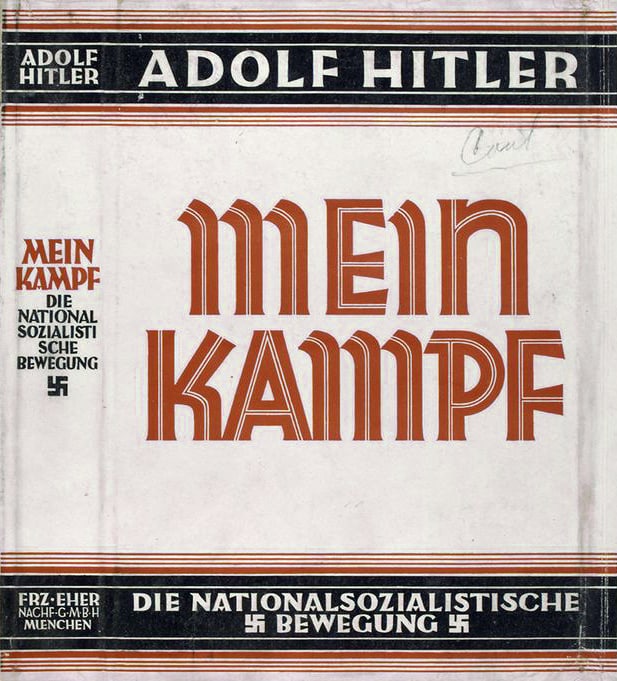
By Unknown author of dust jacket; Adolf Hitler author of volume – This image is available from the New York Public Library‘s Digital Library under the digital ID 487722: digitalgallery.nypl.org → digitalcollections.nypl.org, Public Domain, Link
Hence the prison sentence was actually advantageous to Hitler.
The Dawes Plan spoils Hitler’s plans
In 1924, Charles G. Dawes, who chaired the Dawes Committee, introduced the Dawes Plan. According to this plan, French troops were to evacuate Germany, reparation costs were to be increased gradually, and American banks would loan Germany money.
Due to the Dawes Plan, production increased, prosperity returned, and the economy became stable in Germany.
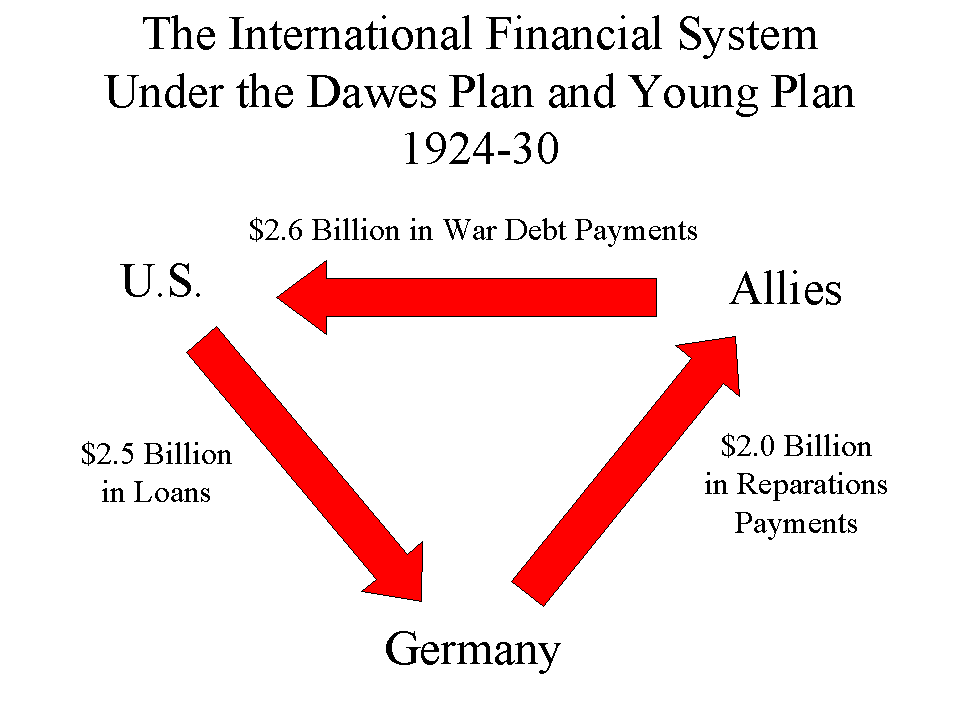
Hence, people became content with the moderate Weimar Republic. So, it became difficult for far-left (Communism) and far-right (Nazism) parties to succeed politically.
This is evident from the fact that, even though the Nazi party grew several-fold during this time (27,000 members in 1925 to 130,000 in 1929), the number of seats won by the party in the German parliament actually fell by more than 50% (32 seats in 1924 to 12 seats in 1928). Therefore, the years 1923 – 1929 are called the lean years of the Nazi party.
The Great Depression aids the growth of the Nazi party
When the Great Depression hit the USA, it was not able to continue to lend money to Germany. As a result, Germany’s economy crumbled once again. Unemployment became a real problem. By 1933, almost 1 in 3 Germans were unemployed.
Consequently, poverty became prevalent. Hence, people started losing faith in the conservative Weimar Republic. Therefore, it became easy for the far-right (Nazis) and far-left (Communists) parties to gain political support.
The upper-class people did not appreciate the communist concept of equal wealth distribution. In comparison, the 25-point program (establishing a third Reich by eliminating social class and making Germany home to only German-speaking people, blaming the Jews for all the problems and making Hitler the only head of the entire hierarchy, etc.) appealed to all classes of people including upper-class businessmen, middle-class workers, nationalists, and farmers.
As a result, the Nazi party gained enormous political support. In 1928, the Nazi party held only 12 seats in the German parliament. However, in 1932, it won 230 seats and became the largest party.
Even though the Nazis were the largest political party, Hitler couldn’t win the presidential elections to become the chancellor. However, after a chain of political dramas, Hitler became the chancellor of Germany in January 1933.
By that time, the Nazi party’s army (SA) had around 2 million members.
Hitler as the German Chancellor
Soon after Hitler became the chancellor, a Dutch communist started a fire in the German parliament. Hitler used this as an excuse to convince the German president to declare an emergency. Even the freedom to hold assemblies, freedom of the press and the freedom of expression were revoked.
Soon, Hitler banned other political parties, killed his opponents, and took control of the state governments. When the German president died the following year, Hitler took the positions of president, chancellor, and commander-in-chief of the army.
Once he had these positions, Hitler started to enlarge the military and create a new airforce, even though it violated the Treaty of Versailles. Members of the armed forces were made to swear loyalty to Hitler and not to Germany.
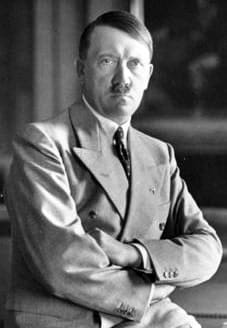
In 1934, Hitler became Germany’s head of state with the title of Führer und Reichskanzler.By Bundesarchiv, Bild 146-1990-048-29A / CC-BY-SA 3.0, CC BY-SA 3.0 de, Link
On the other hand, he also spent a lot of money on programs that benefited the public, like building the Autobahn (German highways). Even though these measures brought prosperity to Germany, in effect, Hitler had successfully transformed democratic Germany into a dictatorship.
The goal of the Nazi party was to create a Third Reich that united genetically superior (according to the Nazi party) Germans under one country while eliminating other races like the Slavs and Jews.
Hitler’s plans of expansion begin
In 1938, Hitler started the realization of this goal. He annexed German-speaking Austria as a federal state of Germany. He also wanted to annex Sudetenland, a part of Czechoslovakia, where a lot of Germans lived. Hitler said that it would be the last demand he makes from Europe. So, to avoid another world war, leaders of France, Britain, and Italy forced Czechoslovakia to surrender Sudetenland.
However, in March next year, German troops invaded the rest of Czechoslovakia. In September, Germany invaded Poland as well. So, Britain and France declared war on Germany, and the second world war began in Europe.
Italy
Let’s look at the events that unfolded in Italy to understand what started world war II.
Which side to take?
In Germany and Austria-Hungary, a large part of the population believed that going to war (First world war) was necessary. However, in Italy, public opinion was divided.
During the beginning of the war, Italy neither had a good relationship with France nor with Austria-Hungary. So, when the war started, a part of the Italian population wanted to remain neutral, a part of it wanted to join the Central Powers to honor the Triple Alliance, and a part of it wanted to join the Allied Powers (Entente) to get territories from Austria-Hungary. Finally, Italy joined the war on the side of Entente in 1915, when they promised to give Italy better territories.
World War 1
Italy had four times as many soldiers as the number of Austro-Hungarian troops in the Italian front. However, Austria-Hungary had highly skilled soldiers, better machinery, and a superior foothold in the mountains. Therefore, the war on the Eastern Front didn’t end as soon as Italy had hoped. Indeed, Italy won only by taking drastic measures and with the help of Britain and France.
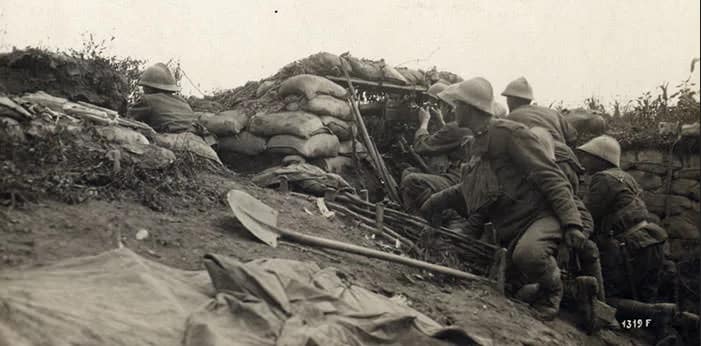
Italian troops awaiting the Austrian attack during the Second Battle of Piave River
Italy’s humiliation
When the war ended, Italy had lost 700,000 soldiers and suffered from a budget deficit. Despite that, Italy did not get any of the German colonies after the war. It did not get any territory from the (disintegration of the) Ottoman Empire either. All of these were claimed by Britain and France.
To add insult to injury, Italy got only fewer territories as promised during the start of the war, for which it joined the war in the first place. Italy felt humiliated, and this annoyed most Italians.
The Two Red years
In addition to that, Italy’s economy was in shatters by now. To support the war, Italy had printed a lot of money. As a result, the value of money decreased. In 1920, the value of one Lira (Italian currency) had reduced to only one-sixth six of its value as in 1913.
Due to the end of the war, major arms and ammunition factories, as well as shipment factories, were closed. As a result, the soldiers returning from the war became unemployed due to a lack of jobs. Unemployment rose to two million, and poverty loomed over the country.
This led to political turmoil and widespread civilian revolts in Italy. Hence, the years 1919 and 1920 came to be known as the ‘Two Red years’ in Italian history.
The Rise of Mussolini
To understand what started world war II, it is necessary to understand how a journalist was able to become the dictator of a country.
Benito Amilcare Andrea Mussolini’s father was a socialist. In addition to that, being a passionate reader, he read books on socialism and communism. Hence, during his early years, his views were mostly socialistic.
As a socialist, he took part in Italian socialist movements. He even worked as the editor of a socialist party’s newspaper. Under Mussolini’s editorship, the reader-base of the newspaper rose from 20,000 to 100,000.
By 1911, Mussolini had become a prominent socialist and a famous journalist in Italy. Indeed, his socialistic views were so strong that he even opposed Italy’s Imperialist views. As a result, he was arrested and sent to serve five months in prison.
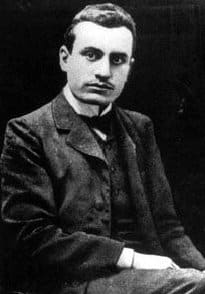
Benito Mussolini in early 1900sBy Unknown author – http://www.televignole.it/mussolini-e-il-trentino-8/, Public Domain, Link
Mussolini’s views change
In August 1914, at the beginning of the first world war, the Italian socialist party opposed the war. Mussolini supported its decision by saying, “Down with the war. We remain neutral.”
However, as the war progressed, his views changed. He got taken over by the idea of anti-Austrian Italian nationalism. He believed that the war offered an opportunity to liberate hundreds of thousands of Italians from the Austro-Hungarian rule. Therefore, he accused the Central powers of trying to colonize Belgium (because Germany attacked Belgium at the start of the war), and Serbia (because Austria-Hungary declared war against Serbia) in the present, and Denmark, France, and Italy in the past.
He believed that this is an opportunity for the Italian nation to become bigger and accused socialism for failing to see it. So, he resigned from the editorship of the party’s newspaper, in which he had previously written articles opposing the war. Soon, he started his own newspaper and started writing articles supporting the war. So, due to his contrasting views and support of the war, he was expelled from the socialist party.
After being ousted from the party, his love for orthodox socialism was lost, and his love for revolutionary nationalism was born. In October 1914, he founded the ‘Revolutionary Fasci for International Action.’ Its members, who called themselves fascists, would later take over Italy.
Due to his support for the war, he got funds from several companies, including an arms firm, and French sources who wanted Italy to join the war on their side.
Mussolini in the first world war
When the war started, Mussolini volunteered to fight. He fought in the trenches for nine months actively. In February 1917, he was fatally wounded by the explosion of a mortar bomb and was sent home.
When he returned from the war, he was hired by the British intelligence agency MI5. His task was to publish articles supporting the war in his newspaper so that Italy doesn’t surrender to Austria-Hungary.
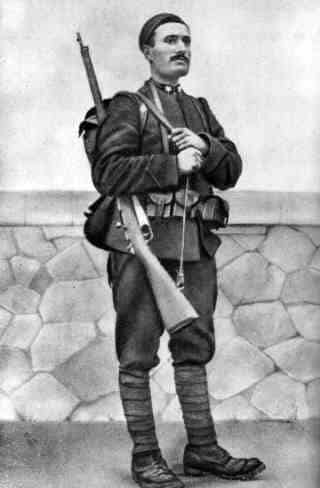
Mussolini as an Italian soldier, 1917By Unknown author – User:Gennarous (english wikipedia) from http://history.sandiego.edu/gen/ww2timeline/Prelude05.html, Public Domain, Link
Mussolini and Plato
Mussolini often read books of various philosophers. Of these, he was greatly influenced by the works of Plato. Mussolini created several principles of fascism using the ideas of Plato.
The main principles of Mussolini’s Fascism are:
- The country (state) is the ultimate object.
- Democracy must be abolished.
- The country should be ruled by an elite individual.
- All the citizens must perform their civic duties to the country.
- Create a class of warriors so that the country can be militarized.
- Control the education system so that future rulers and warriors can be created.
Mussolini claimed that, due to its growing population, Italy needed more place to sustain itself economically. So, it had the right to colonize the nearby countries consisting of genetically inferior people (like Slavs and Africans).
Fascism gains momentum
Coming out of the first world war, Italy suffered from an economic recession. Hence, the years 1919-1920 were called the ‘Two Red Years’ in Italian history.
During these two years, workers’ unions started demanding higher wages; peasants took the lands for themselves; agricultural workers went on strike during harvest time; peasants seized lands for themselves, and; shops were looted or destroyed. Simply put, landowners, shopkeepers, and industrialists in Italy faced a very hard time. The political parties were divided between themselves to do anything about it.
During these years, fascists started creating groups of armed war veterans called black shirts. Using violence to get things done was their motto. By 1920, funded by landowners and industrialists, they started breaking up political meetings, labor unions, and agricultural workers’ organizations.
These armed militias enjoyed the support of landowners, shopkeepers, and, surprisingly, students too. Using their support, fascists created more of these armed groups across Italy.
They overthrew locally elected councils and set up fascist squad leaders as heads of several rural areas in Italy. Thus, fascists started becoming politically strong. In 1921, the Italian fascist party became an official political party. The same year, 35 fascists were elected into the parliament.
Mussolini becomes the Prime Minister
In 1922, in front of his supporters, Mussolini declared, “Either the government will be given to us or we shall seize it by marching on Rome.” True to his word, he organized the ‘March on Rome.’ Fascist supporters (many of them armed) from all over Italy poured into Rome. Once in Rome, they occupied all the government buildings.
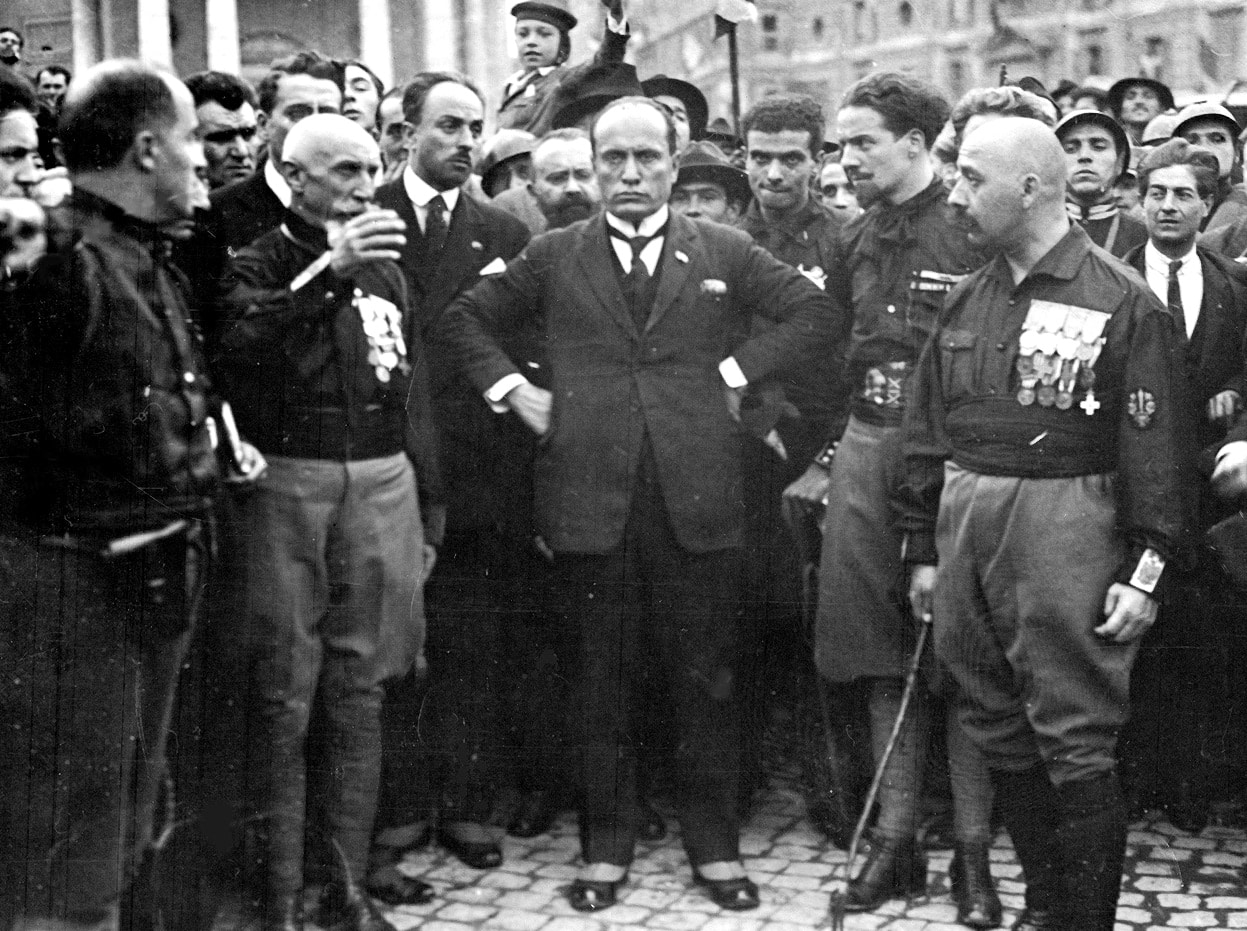
Mussolini during the March on RomeBy Unknown author – [1], Public Domain, Link
The idea itself was terrible. About 30,000 fascists, armed mostly with agricultural tools, would be going up against the army. The Prime Minister wanted to call the military for help. But, King Victor Emmanuel III, fearing a civil war, just after the loss of so many lives in World War 1, made Mussolini the Prime Minister.
Mussolini as the Prime Minister
Over the next few years, his party committed some grave mistakes, like securing votes against a no-confidence vote by violence and killing an opposition party member who questioned the incident. In response, the opposition parties boycotted the parliament.
So, the Blackshirts demanded that Mussolini crush his opposition. He feared that his own troops might revolt against him if he did not oblige.
Therefore, between 1925 and 1927, Mussolini abolished elections, opposition parties, and unions, as well as the freedom of speech and association, and made himself answerable only to the king and not to the parliament. It is noteworthy that, during the same period, several failed assassination attempts were made against Mussolini.
Italian economy under Mussolini
In 1930, when the Global depression hit, Italy did suffer initially. But Mussolini took several measures, which brought the Italian economy better.
- Mussolini launched many public construction programs. He also launched programs to clear out marshlands and create several agricultural towns. These programs demanded huge labor, and a lot of people were employed.
- Most of the trade unions were abolished by the fascists previously and replaced by fascist trade unions. So, there were no chances for workers to revolt.
- Mussolini launched the ‘Gold for the Fatherland’ initiative. Under this initiative, citizens were asked to donate gold to the country voluntarily. He also set up firms that helped bail out failing companies and provided capital to set up new companies. These firms also provided financial supervision and trained managers. These firms played a significant role in making the financial sector more stable.
- He tried to make the country self-sufficient by creating and consuming many goods within Italy. To that end, he introduced high costs for imports of basic goods (like food items) from countries other than Germany. The import of raw materials for industries, however, were not affected.
Due to these measures, Italy became one of the very few economies that didn’t suffer much due to Global depression. This led to a rise in fascism.
The new Roman Empire
Mussolini had become the Prime Minister of Italy. But his original goal was to create a Roman Empire extending up to Africa and the Balkan peninsula.
However, he knew that Italy’s population (40 million) in the 1920s was insufficient to fight a war. He needed a population of 60 million. So, he ordered Italian women to be willing to bear more children.
Mussolini estimated that Italy would have a sufficient population only by the 1930s. So, in the 1920s, he tried to avoid doing anything that would bring him in direct conflict with Britain and France.
Mussolini’s plans of Expansion begin
But in the 1930s, Mussolini put his Italian expansionist dream into action.
In 1933, he planned a surprise attack against France and Yugoslavia. However, France learned of this and prepared itself for the Italian attack. Therefore, Italy did not attack as planned.
Ethiopia was one of the two African countries to escape colonization and a member of the League of Nations. In 1934, he started to arm the border against Ethiopia. In 1935 – 1936, Italy invaded Ethiopia without even declaring war. The League of Nations banned the export of various materials to Italy. But it didn’t ban the export of oil and other essential materials.
Other countries, however, did not take the sanctions issued by the League of Nations seriously. The US increased exports to Italy. The United Kingdom and France did nothing against Italy because they wanted to secure Italian support against Germany.
Consequently, Italy was able to continue its cruel war against Ethiopia (called Abyssinia then), unchecked. Italy’s use of chemical weapons (like mustard gas) and concentration camps to kill thousands of Ethiopian civilians were outrageously inhuman. In total, Italy killed around 382,800 civilians and millions of animals in Ethiopia.
Italy and Germany
Italy’s inhuman warfare in Ethiopia turned public opinion in Britain and France against it. The only countries that could sympathize with the dictatorship and expansionist rule of Italy were Japan and Germany.
In 1936, the Spanish civil war started. It was a war against dictatorship (nationalists) and democracy (republicans and, among others, communists). Like Germany, Italy lent its support to nationalists. On the other hand, the Soviet Union and France gave their support to the republicans. Once again, Italy found itself on the same boat as Germany.
Like Mussolini, Hitler detested democracy and communism as well. So, in 1937, Italy, Germany, and Japan signed a pact against international communism. This brought Italy closer to Germany.
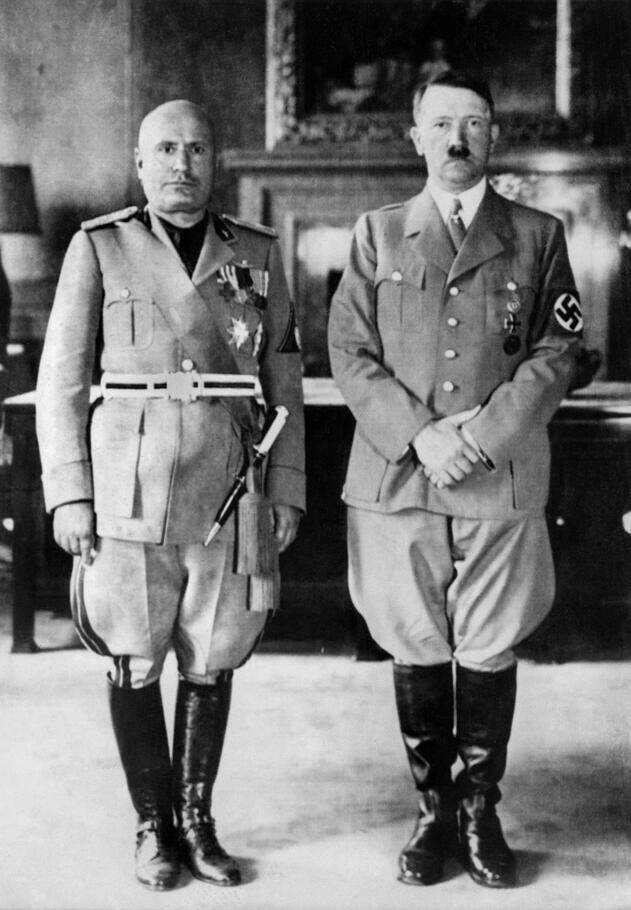
Hitler und Mussolini in München, 1937.Foto: AFPSource: Tagespiegel.de
In 1939, Italy signed the Pact of Steel with Germany, according to which Italy had to provide military support to Germany, should Germany enter into war.
However, when the second world war started in September 1939, Italy did not enter the war on the side of Germany. Instead, it waited to see which side would gain the upper hand, so that it can join that side. Only eight months later, when the defeat of France became obvious did Italy join the war on Germany’s side.
Japan
In Germany and Italy, events that happened after the first world war directly led to the second world war. However, in Japan, the grounds for the second world war were laid almost 90 years before that. So, to understand what started world war 2, we have to take a look at these events.
Meiji Restoration
Japan was under military rule for about 250 years until 1868. During this time, foreigners entering Japan, as well as citizens leaving the country, were given the death sentence.
In 1853, a US Commodore visited Japan to open up its ports for trade. He arrived in sophisticated warships. Looking at these warships, its weapons, and machinery, the Japanese immediately understood that they were far behind the Western powers in technology.
They realized that if they didn’t modernize, they would be colonized by the Western nations. So, some nobles who supported the emperor led a massive movement that aimed to restore power to the emperor and to open the borders. As a result, the military rule ended, and the imperial rule was restored in 1868. This movement was called the Meiji restoration.
The new government sent people abroad to learn western ideas. They used these ideas to accelerate the modernization and industrialization in Japan. Soon, Japan became one of the world’s largest industrialized nations.
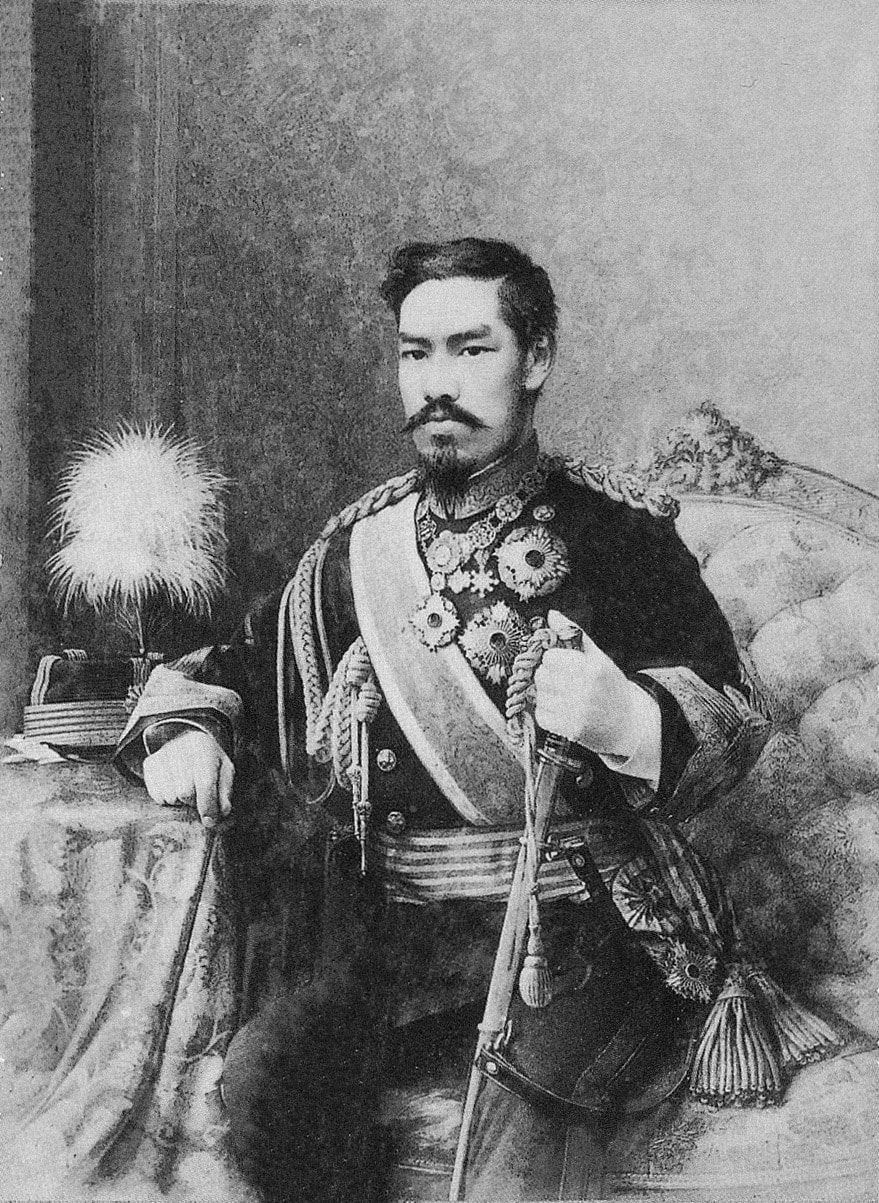
Emperor Meiji – By Artist: Eduardo Chiossone (1833–98); Photographer: Maruki Riyō (also misspelt as Maruki Toshiaki)[3] – (1999-November) 天皇四代の肖像 (Tenno Yondai No Shozo), Tokyo, Japan: 毎日新聞社 (Mainichi Shinbun Sha) ISBN: 4620605549., Public Domain, Link
A solution for the scarcity of Natural resources
Japan was not as rich in natural resources as the USA or Britain. During military rule, japan was an agricultural economy. So, this was not a problem for the country. However, after the Meiji restoration, industrialization in Japan progressed at a rapid rate.
As industrialization progressed, its lack of natural resources became more apparent. Japan imported raw items and natural resources from the outside world, mainly from the USA. However, Japan soon realized that the easier way to cater to the growing demand for natural resources was to conquer less modernized Asian countries like Korea.
The most powerful Asian empire
The Japanese also believed that it was the fault of these countries for not trying to modernize. Hence, as the more powerful nation, it was their right to conquer these countries.
Hence, in 1894 – 1895, the Japanese fought the Chinese in the First Sino-Japanese war over the control of Korea. Using their modernized weapons, they were able to win China and take control of Korea.
Russia had similar interests in Korea and Manchuria. So, in 1904 – 1905, the Japanese fought the Russians in the Russo-Japanese war. In one of history’s most unexpected victories, Japan defeated Russia. It was also the first time an Asian nation defeated a European power.
These two victories earned respect for Japan from all over the world. These established Japan as the most powerful Asian nation.
In 1910, Japan, as the most powerful Asian country, annexed Korea, as a part of its empire. Until 1945, when Korea was freed from Japan, it committed a lot of atrocities in Korea. These atrocities were so inhumane that Koreans still remember them.
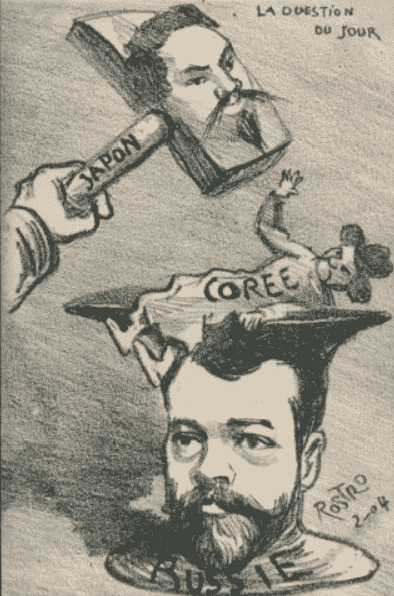
A postcard depicting Japan crushing Korea in its war against Russia – By Unknown – Unknown source, CC0, Link
Japan becomes a democracy
During the first world war, Japan fought as an ally of Britain. But its job was limited to taking over the German colonies in China. Therefore, unlike the western countries, it did not suffer much due to the first world war. If anything, Japan’s economy grew during and after the first world war.
Due to its stable economy, Japan moved towards democracy during the 1920s. Two-party system came into existence.
Extreme nationalism is born
The Great Depression of 1929 destroyed the economies of several countries directly. Japan, however, was not affected directly.
Since Japan has become highly industrial, its economy depended on its exports. Due to the Great Depression, Japan’s exports reduced tremendously, since other countries stopped importing Japanese goods (Eg. Silk).
As Japan had scarce natural resources, it needed to import raw materials to keep its industries (and military) alive. However, when the exports fell, Japan didn’t have enough money to import (buy) raw materials. Hence, the imports reduced as well, thus affecting the economy. As a result, unemployment surged, and food became scarce.
One way for Japan to boost its economy was to expand its territory by invading other Asian countries (Korea, Manchuria, China, etc.). This would have given Japan two advantages.
- It wouldn’t have to import raw materials. It can just take these raw materials from the invaded countries.
- Major western powers could not suffocate Japan’s economy by not exporting raw materials to it.
This view was widely accepted, particularly by the young officers in the army. Hence, the positions in the political parties were taken up by military officers, who favored expansionism and extreme nationalism.
Japan invades Manchuria
In 1931, Japan attacked Manchuria and ousted the Chinese to bring it under the Japanese empire. China asked the League of Nations to help. The League of Nations asked Japan to withdraw from Manchuria. However, Japan did not leave Manchuria. Instead, it left the League of Nations.
Other nations like the UK and France didn’t do anything about it because they wanted to avoid a full-scale war. Hence, the League of Nations became powerless against Japanese aggression. This gave Fascism and Nazism the confidence to grow unchecked as well.
Pearl Harbor
As its next step in expanding its territories, Japan invaded China in 1937. During its invasion, Japanese troops killed up to 300,000 Chinese, including civilians, in the city of Nanjing. This event came to be known as the Nanjing Massacre.
In addition to that, in 1940, Japan attacked French colonies in Southeast Asia to prevent weapons supply to China. (It is notable that, Japan also allied with Axis powers in the same year).
Both these incidents aggravated Americans’ hatred for Japan.
Hoping to control the Japanese aggression, the USA and its allies banned the export of oil and metal to Japan. Since oil and metal are vital for war, Japan couldn’t continue its war in China.
So, Japan planned to invade Southeast Asian colonies of European countries, which could become new sources of raw materials. However, it knew that the USA wouldn’t remain silent if it attacked these colonies.
Hence, Japan wanted to cripple the USA (so that the USA Wouldn’t strike back) until it took control of these colonies. So, it attacked the USA’s naval base in Pearl Harbor (Hawaii) without warning on December 7, 1941. Until then, the neutral USA was trying to hold talks with Japan in a bid to establish peace in the Pacific. When Japan attacked Pearl Harbor, the USA responded by declaring war on Japan one day later.
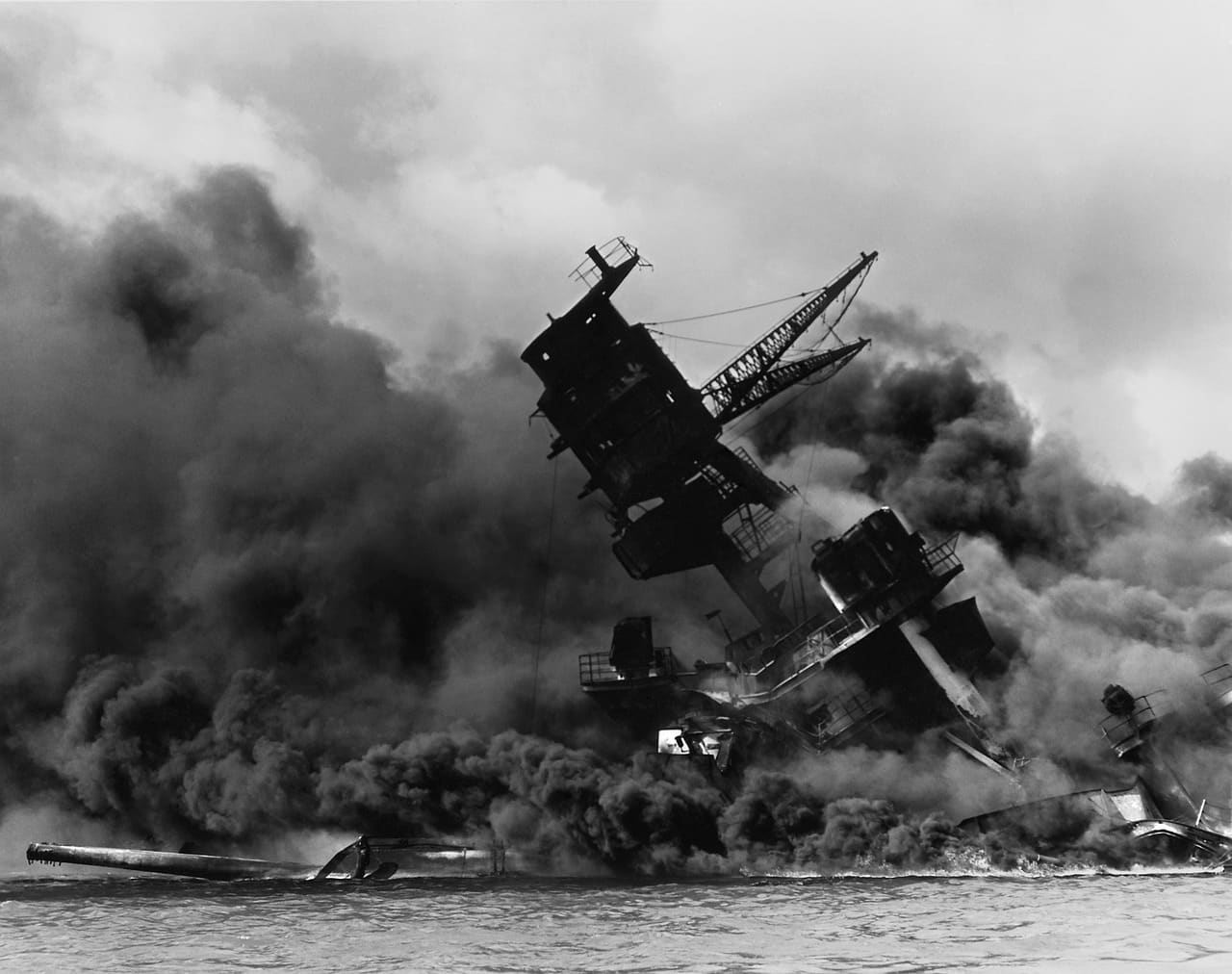
A US ship, during the Japanese attack on Pearl Harbor, 1941 – By Photographer: UnknownRetouched by: Mmxx – This media is available in the holdings of the National Archives and Records Administration, cataloged under the National Archives Identifier (NAID) 195617., Public Domain, Link
The League of Nations
The League of Nations was formed to maintain peace throughout the world. However, most powerful countries at that time, like the USA, the Soviet Union, and Germany, were not its members. The USA decided not to join; the Soviet Union was excluded because it was a communist country, and; Germany was excluded because it started the first world war.
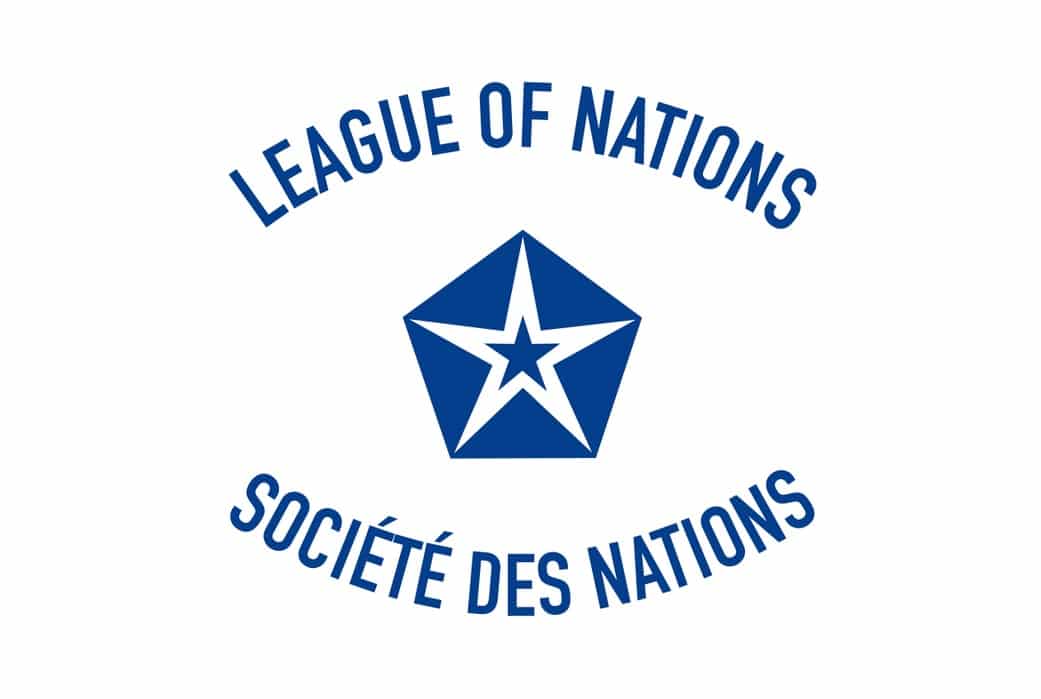
Flag of the League of Nations – By Martin Grandjean – Strictly based on a flag kept by the League of Nations Archives (United Nations Geneva)., CC BY-SA 4.0, Link
Moreover, the League of Nations did not have any military of its own. So, the only way it could punish violent nations was by issuing economic sanctions. When an economic sanction is issued against a nation, other countries don’t trade with it. To this extent, the power of the League of Nations depended directly on the cooperation between its members.
However, due to the Great Depression, the economies of countries suffered greatly. So, every country tried to save its own economy. They knew that if they didn’t trade with a country, other countries would take their place. So, they were reluctant to go along with the sanctions issued by the League of Nations.
As a result, when the League of Nations issued sanctions against Japan, due to its invasion of Manchuria, its members did not oblige. This gave the confidence for Italy and Germany to continue their violent expansionist policies. Similarly, when Italy invaded Ethiopia, other countries did not go through with the sanctions issued by the League of Nations against Italy.
The absence of a strong committee to oversee peace was one of the major reasons for the growth of extreme nationalism in Japan, Italy, and Germany that ultimately led to the second world war.
What started World War II – The Summary
Unlike world war I, which was started by a bullet, what started world war II was a string of events.
- Harsh conditions imposed on Germany by the Treaty of Versailles increased the hatred of Germans against UK and France.
- Economic downturn, political turmoil and workers’ revolts affected Italian industrialists during the ‘Two Red years’. Therefore, they funded the fascists led by Mussolini, who advocated violence to come to power. He crushed labor unions, destroyed democracy and established dictatorship. But his policies improved Italian economy. So, eventually Italians started supporting him.
- The Great Depression of 1929 made people desperate. It helped extreme nationalism grow unchecked in Germany, Italy and Japan, by providing people jobs as soldiers. It also aided the growth of Arms and Shipment industries, which gave people more jobs.
- The League of Nations had no military. So, it could only punish nations by issuing economic sanctions against aggressive countries. However, due to the Great Depression, several of the member nations did not stop trading against these countries, to prevent their own economies from degrading further. This greatly undermined the power of the League of Nations.
- The UK, the USA and France wanted to avoid another huge war. So, they turned a blind eye when other countries become over-aggressive. This gave Japan, Italy and Germany the confidence to pursue their nationalist expansionist policies without repercussions.

Leave a Reply